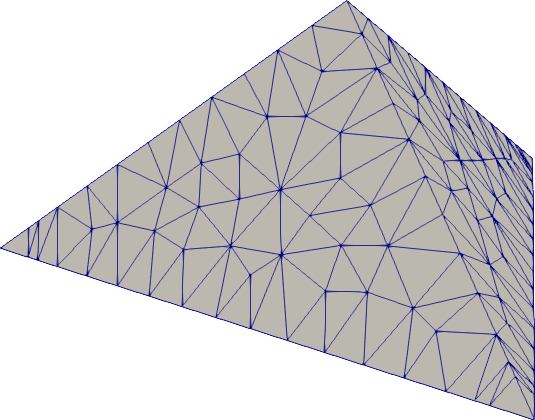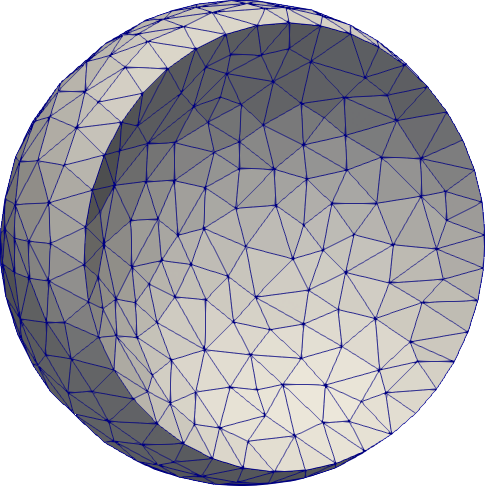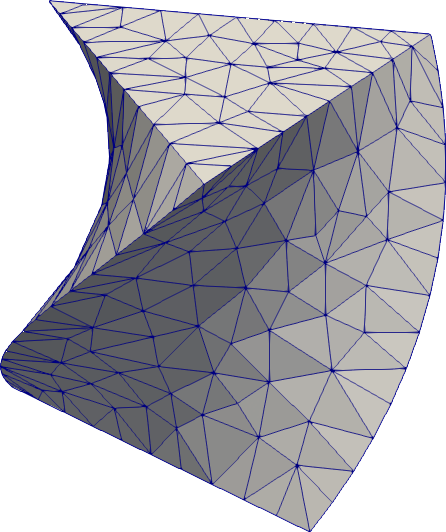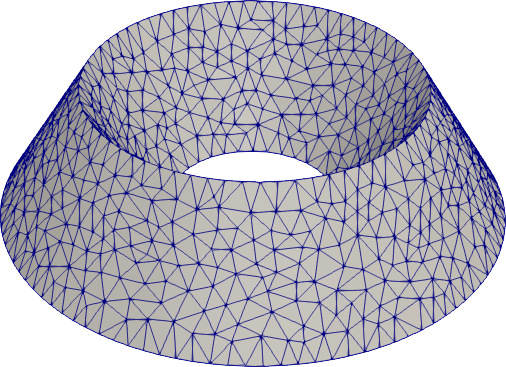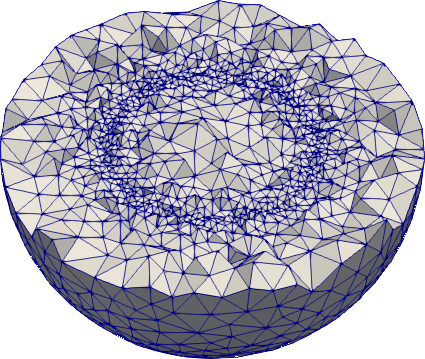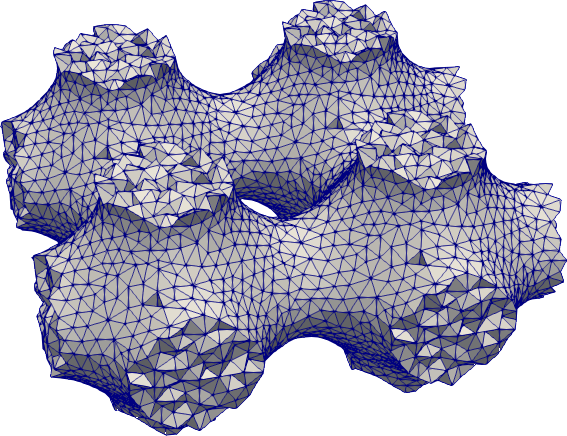Create high-quality meshes with ease.
pygalmesh is a Python frontend to CGAL's 2D and 3D mesh generation capabilities. pygalmesh makes it easy to create high-quality 2D, 3D volume meshes, periodic volume meshes, and surface meshes.
CGAL generates 2D meshes from linear constraints.
import numpy as np
import pygalmesh
points = np.array([[0.0, 0.0], [1.0, 0.0], [1.0, 1.0], [0.0, 1.0]])
constraints = [[0, 1], [1, 2], [2, 3], [3, 0]]
mesh = pygalmesh.generate_2d(
points,
constraints,
max_edge_size=1.0e-1,
num_lloyd_steps=10,
)
# mesh.points, mesh.cellsThe quality of the mesh isn't very good, but can be improved with optimesh.
import pygalmesh
s = pygalmesh.Ball([0, 0, 0], 1.0)
mesh = pygalmesh.generate_mesh(s, max_cell_circumradius=0.2)
# mesh.points, mesh.cells, ...You can write the mesh with
mesh.write("out.vtk")You can use any format supported by meshio.
The mesh generation comes with many more options, described here. Try, for example,
mesh = pygalmesh.generate_mesh(
s, max_cell_circumradius=0.2, odt=True, lloyd=True, verbose=False
)pygalmesh provides out-of-the-box support for balls, cuboids, ellipsoids, tori, cones, cylinders, and tetrahedra. Try for example
import pygalmesh
s0 = pygalmesh.Tetrahedron(
[0.0, 0.0, 0.0], [1.0, 0.0, 0.0], [0.0, 1.0, 0.0], [0.0, 0.0, 1.0]
)
mesh = pygalmesh.generate_mesh(
s0,
max_cell_circumradius=0.1,
max_edge_size_at_feature_edges=0.1,
)Supported are unions, intersections, and differences of all domains. As mentioned above, however, the sharp intersections between two domains are not automatically handled. Try for example
import pygalmesh
radius = 1.0
displacement = 0.5
s0 = pygalmesh.Ball([displacement, 0, 0], radius)
s1 = pygalmesh.Ball([-displacement, 0, 0], radius)
u = pygalmesh.Difference(s0, s1)To sharpen the intersection circle, add it as a feature edge polygon line, e.g.,
import numpy as np
import pygalmesh
radius = 1.0
displacement = 0.5
s0 = pygalmesh.Ball([displacement, 0, 0], radius)
s1 = pygalmesh.Ball([-displacement, 0, 0], radius)
u = pygalmesh.Difference(s0, s1)
# add circle
a = np.sqrt(radius**2 - displacement**2)
max_edge_size_at_feature_edges = 0.15
n = int(2 * np.pi * a / max_edge_size_at_feature_edges)
alpha = np.linspace(0.0, 2 * np.pi, n + 1)
alpha[-1] = alpha[0]
circ = a * np.column_stack([np.zeros(n + 1), np.cos(alpha), np.sin(alpha)])
mesh = pygalmesh.generate_mesh(
u,
extra_feature_edges=[circ],
max_cell_circumradius=0.15,
max_edge_size_at_feature_edges=max_edge_size_at_feature_edges,
min_facet_angle=25,
max_radius_surface_delaunay_ball=0.15,
max_circumradius_edge_ratio=2.0,
)Note that the length of the polygon legs are kept in sync with
max_edge_size_at_feature_edges of the mesh generation. This makes sure that it fits in
nicely with the rest of the mesh.
You can of course translate, rotate, scale, and stretch any domain. Try, for example,
import pygalmesh
s = pygalmesh.Stretch(pygalmesh.Ball([0, 0, 0], 1.0), [1.0, 2.0, 0.0])
mesh = pygalmesh.generate_mesh(s, max_cell_circumradius=0.1)pygalmesh lets you extrude any polygon into a 3D body. It even supports rotation alongside!
import pygalmesh
p = pygalmesh.Polygon2D([[-0.5, -0.3], [0.5, -0.3], [0.0, 0.5]])
max_edge_size_at_feature_edges = 0.1
domain = pygalmesh.Extrude(
p,
[0.0, 0.0, 1.0],
0.5 * 3.14159265359,
max_edge_size_at_feature_edges,
)
mesh = pygalmesh.generate_mesh(
domain,
max_cell_circumradius=0.1,
max_edge_size_at_feature_edges=max_edge_size_at_feature_edges,
verbose=False,
)Feature edges are automatically preserved here, which is why an edge length needs to be
given to pygalmesh.Extrude.
Polygons in the x-z-plane can also be rotated around the z-axis to yield a rotation body.
import pygalmesh
p = pygalmesh.Polygon2D([[0.5, -0.3], [1.5, -0.3], [1.0, 0.5]])
max_edge_size_at_feature_edges = 0.1
domain = pygalmesh.RingExtrude(p, max_edge_size_at_feature_edges)
mesh = pygalmesh.generate_mesh(
domain,
max_cell_circumradius=0.1,
max_edge_size_at_feature_edges=max_edge_size_at_feature_edges,
verbose=False,
)If all of the variety is not enough for you, you can define your own custom level set
function. You simply need to subclass pygalmesh.DomainBase and specify a function,
e.g.,
import pygalmesh
class Heart(pygalmesh.DomainBase):
def __init__(self):
super().__init__()
def eval(self, x):
return (
(x[0] ** 2 + 9.0 / 4.0 * x[1] ** 2 + x[2] ** 2 - 1) ** 3
- x[0] ** 2 * x[2] ** 3
- 9.0 / 80.0 * x[1] ** 2 * x[2] ** 3
)
def get_bounding_sphere_squared_radius(self):
return 10.0
d = Heart()
mesh = pygalmesh.generate_mesh(d, max_cell_circumradius=0.1)Note that you need to specify the square of a bounding sphere radius, used as an input to CGAL's mesh generator.
Use generate_mesh with a function (regular or lambda) as max_cell_circumradius. The
same goes for max_edge_size_at_feature_edges, max_radius_surface_delaunay_ball, and
max_facet_distance.
import numpy as np
import pygalmesh
mesh = pygalmesh.generate_mesh(
pygalmesh.Ball([0.0, 0.0, 0.0], 1.0),
min_facet_angle=30.0,
max_radius_surface_delaunay_ball=0.1,
max_facet_distance=0.025,
max_circumradius_edge_ratio=2.0,
max_cell_circumradius=lambda x: abs(np.sqrt(np.dot(x, x)) - 0.5) / 5 + 0.025,
)If you're only after the surface of a body, pygalmesh has generate_surface_mesh for
you. It offers fewer options (obviously, max_cell_circumradius is gone), but otherwise
works the same way:
import pygalmesh
s = pygalmesh.Ball([0, 0, 0], 1.0)
mesh = pygalmesh.generate_surface_mesh(
s,
min_facet_angle=30.0,
max_radius_surface_delaunay_ball=0.1,
max_facet_distance=0.1,
)Refer to CGAL's documentation for the options.
pygalmesh also interfaces CGAL's 3D periodic mesh generation. Besides a domain, one needs to specify a bounding box, and optionally the number of copies in the output (1, 2, 4, or 8). Example:
import numpy as np
import pygalmesh
class Schwarz(pygalmesh.DomainBase):
def __init__(self):
super().__init__()
def eval(self, x):
x2 = np.cos(x[0] * 2 * np.pi)
y2 = np.cos(x[1] * 2 * np.pi)
z2 = np.cos(x[2] * 2 * np.pi)
return x2 + y2 + z2
mesh = pygalmesh.generate_periodic_mesh(
Schwarz(),
[0, 0, 0, 1, 1, 1],
max_cell_circumradius=0.05,
min_facet_angle=30,
max_radius_surface_delaunay_ball=0.05,
max_facet_distance=0.025,
max_circumradius_edge_ratio=2.0,
number_of_copies_in_output=4,
# odt=True,
# lloyd=True,
verbose=False,
)If you have a surface mesh at hand (like elephant.vtu), pygalmesh generates a volume mesh on the command line via
pygalmesh volume-from-surface elephant.vtu out.vtk --cell-size 1.0 --odt
(See pygalmesh volume-from-surface -h for all options.)
In Python, do
import pygalmesh
mesh = pygalmesh.generate_volume_mesh_from_surface_mesh(
"elephant.vtu",
min_facet_angle=25.0,
max_radius_surface_delaunay_ball=0.15,
max_facet_distance=0.008,
max_circumradius_edge_ratio=3.0,
verbose=False,
)It is also possible to generate meshes from INR voxel files, e.g., here either on the command line
pygalmesh from-inr skull_2.9.inr out.vtu --cell-size 5.0 --odt
(see pygalmesh from-inr -h for all options) or from Python
import pygalmesh
mesh = pygalmesh.generate_from_inr(
"skull_2.9.inr",
max_cell_circumradius=5.0,
verbose=False,
)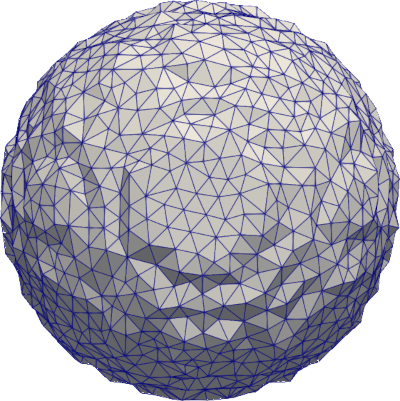 |
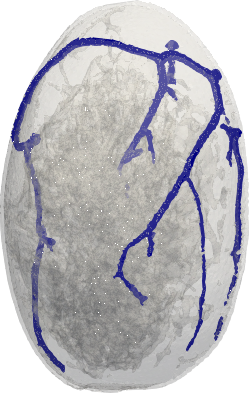 |
|---|
pygalmesh can help generating unstructed meshes from 3D numpy int arrays specifying the
subdomains. Subdomains with key 0 are not meshed.
import pygalmesh
import numpy as np
x_ = np.linspace(-1.0, 1.0, 50)
y_ = np.linspace(-1.0, 1.0, 50)
z_ = np.linspace(-1.0, 1.0, 50)
x, y, z = np.meshgrid(x_, y_, z_)
vol = np.empty((50, 50, 50), dtype=np.uint8)
idx = x**2 + y**2 + z**2 < 0.5**2
vol[idx] = 1
vol[~idx] = 0
voxel_size = (0.1, 0.1, 0.1)
mesh = pygalmesh.generate_from_array(
vol, voxel_size, max_facet_distance=0.2, max_cell_circumradius=0.1
)
mesh.write("ball.vtk")The code below creates a mesh from the 3D breast phantom from Lou et al available here. The phantom comprises four tissue types (background, fat, fibrograndular, skin, vascular tissues). The generated mesh conforms to tissues interfaces.
import pygalmesh
import meshio
with open("MergedPhantom.DAT", "rb") as fid:
vol = np.fromfile(fid, dtype=np.uint8)
vol = vol.reshape((722, 411, 284))
voxel_size = (0.2, 0.2, 0.2)
mesh = pygalmesh.generate_from_array(
vol, voxel_size, max_facet_distance=0.2, max_cell_circumradius=1.0
)
mesh.write("breast.vtk")In addition, we can specify different mesh sizes for each tissue type. The code below
sets the mesh size to 1 mm for the skin tissue (label 4), 0.5 mm for the vascular
tissue (label 5), and 2 mm for all other tissues (default).
mesh = pygalmesh.generate_from_array(
vol,
voxel_size,
max_facet_distance=0.2,
max_cell_circumradius={"default": 2.0, 4: 1.0, 5: 0.5},
)
mesh.write("breast_adapted.vtk")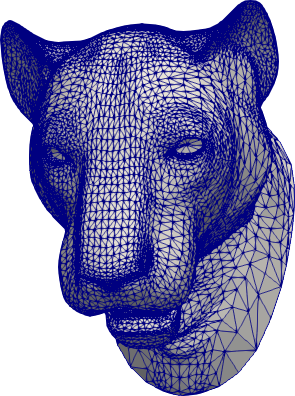 |
 |
|---|
pygalmesh can help remeshing an existing surface mesh, e.g.,
lion-head.off. On
the command line, use
pygalmesh remesh-surface lion-head.off out.vtu -e 0.025 -a 25 -s 0.1 -d 0.001
(see pygalmesh remesh-surface -h for all options) or from Python
import pygalmesh
mesh = pygalmesh.remesh_surface(
"lion-head.off",
max_edge_size_at_feature_edges=0.025,
min_facet_angle=25,
max_radius_surface_delaunay_ball=0.1,
max_facet_distance=0.001,
verbose=False,
)For installation, pygalmesh needs CGAL and Eigen installed on your system. They are typically available on your Linux distribution, e.g., on Ubuntu
sudo apt install libcgal-dev libeigen3-dev
On MacOS with homebrew,
brew install cgal eigen
After that, pygalmesh can be installed from the Python Package Index, so with
pip install -U pygalmesh
you can install/upgrade.
If pygalmesh fails to build due to fatal error: 'Eigen/Dense' file not found
you will need to create a symbolic link for Eigen to be detected, e.g.
cd /usr/local/include
sudo ln -sf eigen3/Eigen Eigen
It's possible that eigen3 could be in /usr/include instead of
/usr/local/install.
For manual installation (if you're a developer or just really keen on getting the bleeding edge version of pygalmesh), there are two possibilities:
- Get the sources, type
python3 setup.py install. This does the trick most the time. - As a fallback, there's a CMake-based installation. Simply go
cmake /path/to/sources/andmake.
To run the pygalmesh unit tests, check out this repository and type
pytest
CGAL offers two different approaches for mesh generation:
- Meshes defined implicitly by level sets of functions.
- Meshes defined by a set of bounding planes.
pygalmesh provides a front-end to the first approach, which has the following advantages and disadvantages:
- All boundary points are guaranteed to be in the level set within any specified residual. This results in smooth curved surfaces.
- Sharp intersections of subdomains (e.g., in unions or differences of sets) need to be specified manually (via feature edges, see below), which can be tedious.
On the other hand, the bounding-plane approach (realized by mshr), has the following properties:
- Smooth, curved domains are approximated by a set of bounding planes, resulting in more of less visible edges.
- Intersections of domains can be computed automatically, so domain unions etc. have sharp edges where they belong.
See here for other mesh generation tools.
This software is available under the GPLv3 license as well as a commercial license. If you'd like to use this software commercially, please contact the author.










